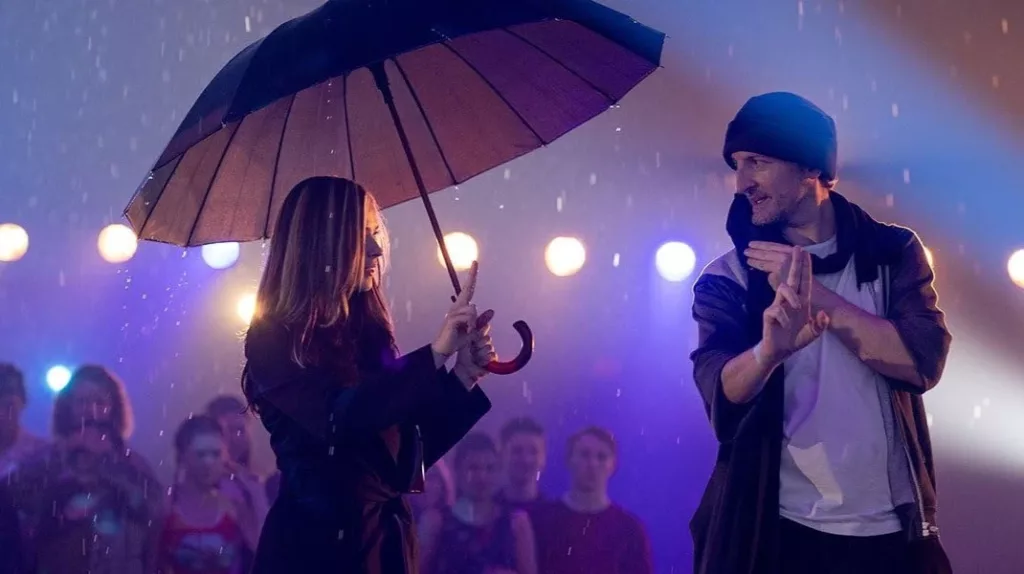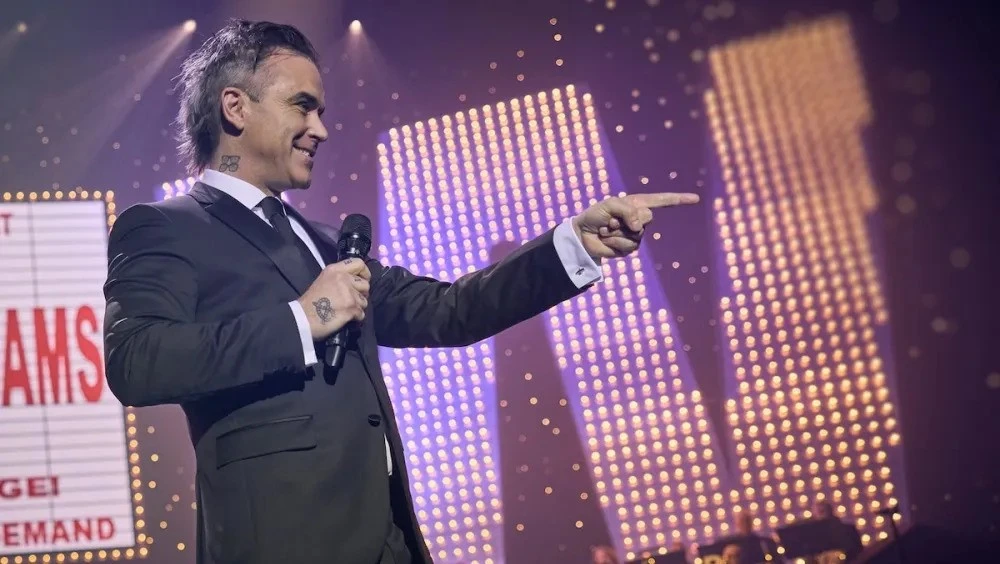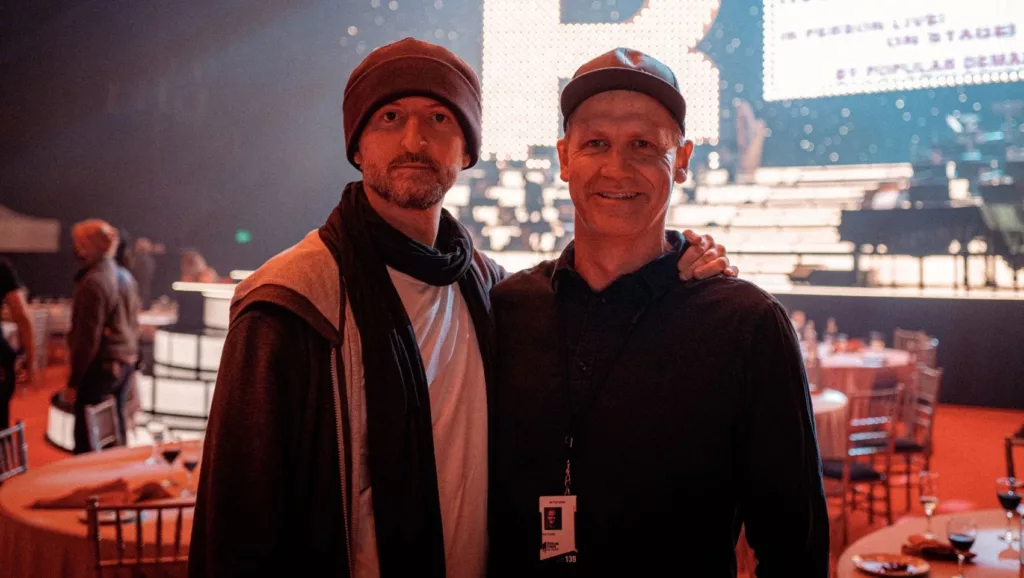Michael Gracey upends conventions with his latest cinematic feat, Better Man. Known for infusing popular musicals like The Greatest Showman with fresh innovations, Gracey pushes boundaries further here. His subject is Robbie Williams, the beloved British pop icon—but depicted in a way nobody has seen before.
Against expectations, Williams is portrayed from start to finish using CGI animation. Gracey brings the singer to life as a photorealistic chimpanzee. You read that correctly! When Williams offhandedly called himself a “performing monkey,” Gracey took the remark to an unexpected level. This unusual choice separates Better Man from run-of-the-mill music biopics.
Familiar themes are explored, from Williams’ childhood ambitions to the triumphs and struggles that come with fame. But Gracey ensures the story remains riveting through his innovative direction. Viewers follow the chimp’s journey, voiced by Williams himself, from awkward schoolkid to worldwide superstar. Musical showstoppers dazzle with Gracey’s signature flair, reinventing the genre for a new generation.
Does this unconventional concept work? Opinions may vary, but one thing is clear: Gracey refuses to color inside the lines. By thinking outside the box, he sparks discussion and challenges old formulas. Better Man aims to entertain above all else, an infectious spirit this filmmaking maverick has shown a gift for time and again. When any director lives by their creativity as boldly as Gracey, the results are sure to polarize—and far more interesting for it.
Breaking the Mold
From boyhood dreams to battling inner demons, Better Man traces Robbie Williams’ iconic career. Born with showbiz in his blood, young Robbie shows an early knack for performance. Despite struggles at school, his talent shines through in plays. We see this trait stems from his father Peter, also a performer who left seeking stardom.
Robbie lands a spot in smash-hit boyband Take That, catapulting to fame alongside good friends he considers family. Nothing prepares them for stratospheric success, as one showtopping musical number after another leaves audiences in awe. Their high-energy brand of pop dominates charts worldwide. However, tension grows within the group as Robbie pursues a solo path. His ousting brings conflict and pain, though fans continue flocking to his solo shows.
None compare to the spectacle of his historic Knebworth performance. Over a quarter million fans gather to see Robbie at his commercial peak. Yet underneath, self-doubt and addiction issues simmer. A whirlwind romance ends with an abortion, deepening emotional turmoil. Drugs and unhealthy relationships become crutches as his private life spirals. Hitting rock bottom, it seems stardom offers no shelter from personal demons.
Gracey’s film goes to brave places, trusting audiences can handle raw truths. Perhaps it’s why Williams felt comfortable granting such intimate access. By baring his soul through first-hand accounts, Robbie invites viewers into his journey in a way no other biopic has before. Some find his redemption too neatly tied, but most agree Gracey crafted the definitive portrait of this legend, warts and all.
Cinematic Spectacle
Michael Gracey raises the bar with his visual flair. The musical numbers sparkle with creativity, reinventing the movie music form. Complex choreography and ever-moving cameras immerse you in each song. “Rock DJ” especially stands out—a seamless four-minute shot following Take That down packed London streets. It’s no small feat to craft such dynamic long takes.
Of course, the star of the show is Robbie himself—or rather, the hyper-realistic CGI monkey bringing him to life. It’s a testament to the technical wizards at Weta that this simian seems so expressive. Gracey plays with closeups on its emotive eyes, drawing us deeper into Robbie’s inner world. The animators capture every nuance, from smiles to scowls. It’s hard to believe this isn’t a real actor.
Occasionally, spectacle overrides substance. Gracey risks prioritizing visual imagination over emotional authenticity. Some gushy production numbers feel overdesigned—style over meaning. Yet his flair remains undefinable. When pairing music with imagery, few can compose snapshots as transportive as Gracey. He may push bounds, but his experiments invite discussion far more than predictable fare.
If questions surface around fully committing to the monkey metaphor, its technical achievements still astound. Gracey pushes creative boundaries, and fans thrill to see where his daring takes the artform next. In redefining expectations at every turn, his influence will ripple through cinema for years to come.
No Stone Left Unturned
Michael Gracey leaves no facet of Robbie Williams’ personality untouched. The director depicts the singer in an unflinchingly honest way—flaws and all. Williams emerges as complex, contradictory, and, above all, human.
Gracey pulls no punches in showing Williams’ enormous ego and self-absorption. Through candid narration, we see how his insecurities drive reckless behavior. Charming one moment, brash the next, Williams never pretends to be anything he’s not. This raw portrayal risks making him uncomfortable to root for.
Yet his transparency also engenders real vulnerability. Gracey humanizes Williams by honoring his invitation to lay bare lifelong struggles for approval and identity. Fans old and new gain deeper empathy for the man behind the tabloid persona.
While uncomfortable at times, the unrelenting character study rings true. Gracey sees through Williams’ bravado to the little boy still seeking love and recognition. This adds poignancy to later triumphs and setbacks alike.
Others’ unconditional support reminds us that even “assholes” deserve redemption if willing to look within. Williams’ compassion for others in turn shows inner growth. Gracey suggests how his journey echoes lives everywhere, hers and flaws.
By resisting easy likes or dislikes, Gracey sparks complex thoughts on celebrity and the human condition. Williams’ compelling story survives due to its subject’s cooperation, not in spite of the director’s unflinching, heartfelt gaze.
Some criticize cliches elsewhere, but Gracey’s bold sincerity in shaping a real human being leaves an indelible mark. Williams’ resilience, for all his missteps, becomes this film’s beating heart.
Beyond the Blueprint
With Better Man, Michael Gracey sets out to reshape tired industry standards. Where music biopics usually stick to familiar formulas, Gracey deconstructs tradition at every turn.
His goal isn’t just subversion for its own sake, though. Beneath shock value and surface spectacle lies deeper intention—to honor the erratic humanity often glossed over. Robbie emerges flawed yet sympathetic, not thanks to any redemptive arc but simple honesty.
Gracey sees past simplistic narratives of rise and fall, digging into what really propels artists and leaves scars. For Robbie, an adoring yet neglectful father remains the root of insecurity, fueling both talent and self-sabotage.
The director understands addiction and codependency as symptoms, not central villains, of the story. By peering into what really motivates Robbie—a lost child’s unquenchable need for approval—Gracey finds empathy where others give judgment.
Some find this reframing sacrifices momentum, but its insights linger long after. Few biopics explore the messiness of the human condition and artists’ with such compassion. If deconstruction impacts pacing, Gracey prefers audiences reflect on core themes deeply—like the life-long impact of early wounds and how love truly heals where wealth and fame fail.
By discarding familiar pipelines, Gracey crafts something artful yet deeply relatable. He proves sometimes the boldest choices emerge not from breaking rules but from recognizing there are no rules—only lives too personal to fit any single script.
Beyond the boundaries
Michael Gracey takes bold strides with Better Man, but not all his experiments land as smoothly. The director swings for the fences with each vibrant musical set piece and inventive visual. Gracey clearly aims to stir imagination on a grand scale.
Scenes like the band’s iconic “Rock DJ” flash mob through the London floor with technical panache and infectious spirit. It’s no surprise Gracey’s Showman left such a mark. His flair for dynamic spectacle seems unparalleled.
Yet stretching Williams’ life across two hours plus proves a mixed blessing. While commending Gracey’s refusal to sanitize darker truths, the picture’s length spotlights one-dimensional supporting roles. Thinner characters undermine later reconciliation arcs.
Tightening pace in Act II might balance disclosure with momentum. As is, addiction turmoil drags in repetitive beats. Gracey ensures our comprehending story and subject alike, but greater profiling of Williams’ supports would bolster final resolutions.
In the end, Gracey swings for rewriting norms but connects most in spotlighting our shared fragility. By resisting easy roles, he sparks thoughtful talks on life’s fluid complexity. Better Man divides, as all finest art does, but its visionary will long inspire creative rule-breakers.
Making the Familiar New
Better Man pushes boundaries in redefining the musical biopic. Gracey’s bold vision elevates visuals to new heights with Robbie depicted through vivid CGI. Yet connecting audiences to the complex man within proves trickier.
This film divides as any daring work must. Some find Robbie’s portrayal off-putting or redemption rushed. Others believe Gracey alone could make such raw honesty compelling. In shining light on familial wounds and addiction, he sparks thoughtful dialogue.
Ultimately, Gracey trusts viewers to appreciate life’s messy complexity. By partnering so closely with Robbie and respecting personal truths over formulas, he crafts the singer’s definitive portrait. Better Man stays with you not by typical beats but in lingering questions of the human experience.
In reimagining possibility, Gracey ensures his influence. Future biopics daring similar reinvention will be viewed through this film’s indelible lens. It proves even bold rethinkings can succeed if grounded in empathy, authenticity, and faith in creative vision over safety. For better or worse, Better Man is most of all Gracey’s own.
The Review
Better Man
Gracey takes bold strides in redefining the musical biopic genre, bringing director vision and subject's humanity to the fore despite flaws. Under its unconventional CGI surface, Better Man challenges with its unflinching empathy for the complex messiness of life. Verdict: an imperfect yet daring work that leaves an indelible mark.
PROS
- Groundbreaking CGI rendering of Robbie Williams
- Gracey's dynamic camerawork and choreography for musical numbers
- Raw and candid portrayal of Williams' personal struggles
- Prioritizes emotional authenticity over formulaic story beats
CONS
- Long runtime accentuates one-dimensional supporting roles
- Repetitive depiction of Williams' downward spiral drags the story
- Redemption arcs feel rushed and not entirely earned




















































Discussion about this post